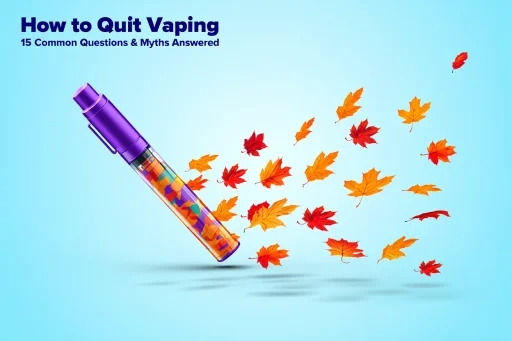How to Quit Vaping: 15 Common Questions & Myths Answered

Answering 15 of Your Most Pressing Questions About How to Quit Vaping
🧐 Debunking Common Vaping Myths
Myth: "Vaping is safer than smoking, so there's no real need to quit."
Fact: While many experts agree that vaping is likely less harmful than smoking combustible cigarettes, "less harmful" does not mean "harmless." E-cigarette aerosol is not just water vapor. According to the CDC, it can contain harmful substances like nicotine, cancer-causing chemicals, volatile organic compounds, and heavy metals. The long-term health effects are still largely unknown, making quitting a wise preventative measure.
Myth: "I only use nicotine-free vapes, so I'm not at risk."
Fact: Even without nicotine, the act of vaping can pose health risks. Research from institutions like Johns Hopkins Medicine has shown that the liquids used in e-cigarettes (like propylene glycol and vegetable glycerin), along with various flavorings, can create toxic chemicals and lung irritants when heated. These can lead to inflammation and damage to lung cells over time.
Myth: "Vaping is just a habit, not a true addiction."
Fact: For products containing nicotine, vaping is absolutely an addiction. Nicotine is a highly addictive substance that alters your brain's chemistry, creating a powerful physical and psychological dependence. The "habit" part is the routine you build around using the vape, but the underlying driver is often a true chemical addiction.
Myth: "Quitting vaping will destroy my social life."
Fact: This is a common fear, but often overestimated. While there may be an adjustment period, true friendships are not based on a shared habit. You can prepare by planning alternative activities, communicating your decision to friends, and practicing how to say "no, thanks." You might even inspire others to consider their own health.
🧭 Navigating the Quitting Process
Question: "Should I gradually taper down or just quit cold turkey?"
Answer: There is no single "right" answer; both methods can be effective.
• Cold Turkey: This involves stopping completely on your quit day. It can be intense, but it creates a clean break.
• Tapering: This means gradually reducing your nicotine strength or how often you vape. It can lessen withdrawal symptoms but requires significant discipline.
Consider your personality and what has worked for you in the past. Consulting a healthcare professional can also help you decide.
Question: "What's the best way to handle intense cravings?"
Answer: Remember that most cravings only last 5-10 minutes. The key is to have a plan to get through that short window. A popular technique is the "4 Ds":
• Delay: Tell yourself you'll wait just 10 more minutes. The urge will often pass.
• Distract: Do something completely different. Go for a walk, listen to music, or call a friend.
• Deep Breathe: Inhale slowly for four seconds, hold for four, and exhale for six. This calms the nervous system.
• Drink Water: Sipping cold water can satisfy oral fixation and help the craving pass.
Question: "What should I do if I relapse and use my vape again?"
Answer: A relapse is not a failure; it is a learning opportunity. The most important thing is to not let a slip-up turn into a full return to vaping. Analyze what triggered the relapse—was it stress, a social situation, or boredom? Use that information to strengthen your plan for next time. Forgive yourself and get right back on track with your goal of quitting your vape.
Question: "Are there any medications or therapies that can actually help?"
Answer: Yes, several evidence-based options exist.
• Nicotine Replacement Therapy (NRT): Products like patches, gum, and lozenges provide controlled doses of nicotine to ease withdrawal symptoms.
• Prescription Medications: Drugs like Varenicline and Bupropion can reduce cravings and withdrawal.
• Behavioral Therapy: Cognitive Behavioral Therapy (CBT) can help you identify triggers and develop coping strategies.
Always consult a doctor to see if these options are right for you.
Question: "How can I manage stress without vaping?"
Answer: This is a crucial step in learning how to quit vaping successfully. The key is to find healthy, sustainable replacements. Effective stress-management techniques include regular physical exercise, mindfulness or meditation apps, engaging in a hobby you love (like music or art), and practicing deep-breathing exercises. Initially, these may feel less effective than a vape, but over time they build true resilience to stress.
❤️🩹 Understanding the Health Impacts
Question: "Is it true I will gain weight if I quit vaping?"
Answer: This is a valid concern, as nicotine can slightly suppress appetite and increase metabolism. Some people may experience a small weight gain after quitting. However, this is not inevitable and can be managed by adopting healthy habits. Focus on staying hydrated, keeping healthy snacks (like carrots or nuts) on hand for oral fixation, and incorporating light physical activity into your routine. The long-term health benefits of quitting far outweigh the risk of a minor, manageable weight gain.
Question: "Will quitting make my anxiety or depression worse?"
Answer: This is a paradox. While you might feel that vaping calms you, it actually perpetuates a cycle of anxiety. The relief you feel is temporary, and it's quickly followed by withdrawal, which itself causes anxiety and irritability. While you may experience a short-term increase in anxiety immediately after quitting, numerous studies have shown that people's overall mental health, including anxiety and depression levels, improves significantly a few weeks after they successfully quit nicotine products.
Question: "How soon will my body start to heal after I quit?"
Answer: The positive effects begin almost immediately. According to the American Heart Association and other health bodies, a general timeline looks like this:
• Within 20 minutes: Your heart rate and blood pressure start to drop back to normal.
• Within 12 hours: The carbon monoxide level in your blood returns to normal.
• Within 2 weeks to 3 months: Your circulation and lung function begin to improve.
• Within 1 year: Your risk of heart attack drops dramatically.
Question: "Can my lungs fully recover from vaping?"
Answer: The body's capacity for healing is remarkable. While severe, long-term damage may not be entirely reversible, quitting allows your lungs to begin cleaning themselves out and reducing inflammation. Many people experience less coughing and shortness of breath within a few months. The younger you are and the shorter the duration you have vaped, the better the prognosis for significant recovery. Quitting is the single most important step you can take for your lung health.
Question: "What is 'popcorn lung' and should I be worried?"
Answer: "Popcorn lung" (bronchiolitis obliterans) is a rare but serious lung disease linked to a flavoring chemical called diacetyl. While diacetyl was famously used in microwave popcorn, it has also been found in some e-liquids, particularly sweet flavors. While the risk from a modern vape is considered low by many researchers compared to its presence in cigarettes, it highlights the danger of inhaling chemicals not intended for the lungs. This is another strong reason why learning how to quit vaping is a protective health choice.





